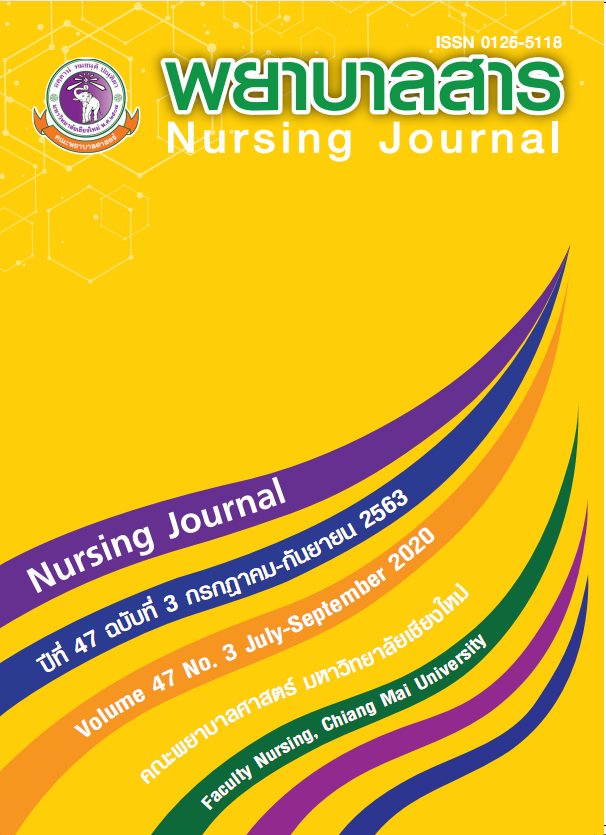Effects of a Self-Management Program on Health Behaviors ofEmployees at the Electricity Generating Authority of Thailand
Keywords:
Effects of Program,Self-Management, Employees at the Electricity Generating Authority of Thailand, Health Behaviors, HypertensionAbstract
Hypertension is a non-communicable chronic disease that causes premature death. Self-management for changing health behavior reduces the risk of hypertension. This quasi-experimental study aimed to compare the health behavior scores of employees in the pre-and post-programmed care groups, and to compare the health behavior scores between the group receiving the program and the group receiving regular care. The samples were 46 employees of Electricity Generating Authority of Thailand who are at risk for high blood pressure. Their Body Mass Index is equal to 23 kg/square meter. The experimental group included 23 employees, and the control group also included 23 employees. Research instruments used were 1) a self-management program to modify behavior created based on a literature review of hypertension management under the concept of Creer (2000) consisting of six procedures: goal setting, data collection, data processing, decision making, action, and action feedback, 2) a handbook of practice to reduce the risk of hypertension. The total duration was eightweeks, and the instruments used for data collection were 1) general information questionnaire, 2) blood pressure data record and BMI evaluation, and 3) health behavior questionnaire reviewed by three experts. The mean score of health behavior was 0.95 and the reliability of health behavior was 0.83. Descriptive statistics and paired t-test were used in control and experimental groups compared between pre and post tests and t-test after the experiment.
The findings indicated that:
- After participating in the program, the health behavior scores of the employees in the group receiving the program were significantly higher than before (p <.001).
- After receiving the program, the health behavior scores of the employees in the group receiving the program were significantly higher than the control group (p <.001).
It can be concluded that the effect of self-management program is important to help employees to have better health behaviors, reduce the risk of hypertension, and the program can also be used to reduce the risk of other chronic diseases.
References
Bodenheimer, T., Wagner, E. H., & Grumbach, K. (2002). Improving primary care for patients
with chronic illness. The Journal of the American Medical Association, 288.
Brown, V. A., Bartholomew, L. K. & Naik, A. D. (2007). Management of chronic hypertension in older men: An exploration of patient goal-setting. Patient Education & Counseling, 69(1-3), 93-9.
Bureau of Non-Communicable Diseases. (2016). Guideline to hypertension care. Bangkok: War
Veterans Organization of Thailand Under Royal Patronage of His Majesty the King.
(in Thai)
Bureau of Non-Communicable Diseases, Department of Disease Control. (2016). Campaign issues for hypertension day 2016. Retrieved from http://www.thaincd.com/document
/file/info/non-communicable-disease. (In Thai)
Burns, N., & Groove, S. K. (2009). The practice of nursing research: appraisal, synthesis, and generation of evidence. St. Louis: Saunders Elsevier.
Creer, L. T. (2000). Self-management of chronic illness: Handbook of self-regulation. California: Academic.
Curtin, R. B., Bultman Sitter, D. C., Schatell, D., & Chewning, B. A. (2004). Self-management, knowledge, and functioning and well-being of patients on hemodialysis. Nephrology Nursing Journal, 31(4), 378-386.
Jomphong, S. (2003). Effect of self-efficacy enhancement on health behaviors among
hypertensive patients. Journal of Nurse Science, 29(4), 1-7. (in Thai)
Office of the Permanent Secretary, Ministry of Public Health (2015). Strategic plan for good health, Thai way of life 2011-2020. Retrieved from http://ops.moph.go.th/public/
index.php/policy_plan.
Phongtiwaphan, C. (2015). Self-management process on health behaviors of hypertensive
patients at Umong Tambon Health Promotion Hospital, Lamphun Province. Graduate
School, Chiang Mai University. (in Thai)
Rakphanich, P. (2005). Exercise for Hypertension diseases. New horizons in management of hypertension. Thai Hypertension Society Coordinate with Faculty of Medicine Ramathibodi Hospital. (in Thai)
Sangdet, S., & Limtrakul, P. (2012). Health promotion guidelines for pre-hypertensive
at risk groups in a community. Journal of Nursing and Health, 44. (In Thai)
Wongphutkham, S. (2008). Effects of self-management on health behaviors and blood
pressure among hypertensive patients. Graduate School, Chiang Mai University.
(in Thai)
World Health Organization [WHO]. (2020). World health statistic: Monitoring health for the
SDGs 2017. Retrieved from https://www.who.int/gho/publications/world_health_
statistics/2017/en/
Downloads
Published
How to Cite
Issue
Section
License
บทความที่ได้รับการตีพิมพ์เป็นลิขสิทธิ์ของวารสารพยาบาลสาร
ข้อความที่ปรากฏในบทความแต่ละเรื่องในวารสารวิชาการเล่มนี้เป็นความคิดเห็นส่วนตัวของผู้เขียนแต่ละท่านไม่เกี่ยวข้องกับมหาวิทยาลัยเชียงใหม่ และคณาจารย์ท่านอื่นๆในมหาวิทยาลัยฯ แต่อย่างใด ความรับผิดชอบองค์ประกอบทั้งหมดของบทความแต่ละเรื่องเป็นของผู้เขียนแต่ละท่าน หากมีความผิดพลาดใด ๆ ผู้เขียนแต่ละท่านจะรับผิดชอบบทความของตนเองแต่ผู้เดียว






